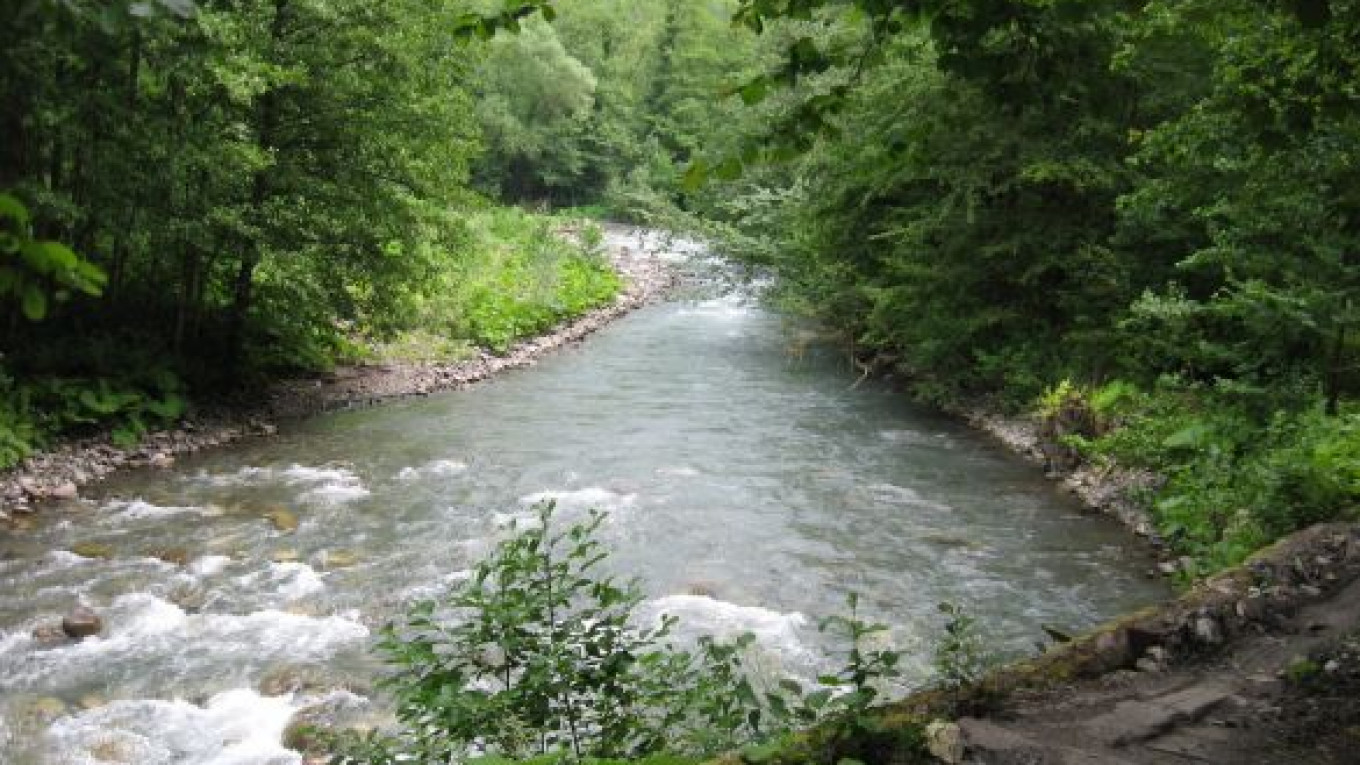UNESCO and environmentalists are alarmed over a government plan to construct a paved road through a UNESCO World Heritage Site to an elite ski resort linked to Prime Minister Vladimir Putin.
The winners for two tenders for road construction at the Shaposhnikov State Caucasus Nature Biosphere Preserve, worth a combined 250 million rubles ($8 million), are to be announced next and , respectively, on Zakupki.gov.ru, the state tenders site.
Shaposhnikov preserve officials say the road is needed to connect the Solokh-Aul village near Sochi and a meteorological station on the premises of the preserve.
But the preserve does not host a meteorological station. What's more, an unpaved road already passes through the preserve, allowing cars and pedestrians to travel across the terrain without comfort but also at no cost to the environment, ecological activists say.
Conveniently located near the end of the future road, however, is the Lunnaya Polyana (Moon Glade) ski resort, where Putin, a ski enthusiast, is believed to enjoy an occasional break from government work.
"This road is a first step toward providing transportation access to the Lunnaya Polyana resort," Andrei Rudomakha, an activist with Environment Watch North Caucasus, said in a telephone interview.
An asphalt road would damage the forest and the fauna in the preserve, which is a part of the Western Caucasus, a UNESCO World Heritage Site situated between the Black Sea and Mount Elbrus.
The project "would go against the decision of the World Heritage Committee," a UNESCO spokesman said in an e-mailed statement. When contacted by The Moscow Times, he acknowledged that the organization was unaware of the tender, but he said UNESCO had contacted Russian authorities for more information. No reply was reported.
The environmentalists have appealed to the Audit Chamber and Natural Resources and Environment Ministry, but neither replied, Rudomakha said.
The ministry, admittedly, has taken steps to allay their concerns, with Deputy Minister Rinat Gizatulin subsequently announcing that a meteorologic station would be built next year at the end of the road.
"The station will go into operation in 2013 and will also be used during the [2014 Winter] Olympics in Sochi," Gizatulin Radio Liberty earlier this month.
But the promise of a station did little to mollify Rudomakha. "Even if the station is built, there is no need to build a paved road for it," he said.
Back in 2008, the opposition-minded New Times magazine published an investigative report about the Lunnaya Polyana resort, linking a new, three-story log house built there to Putin. Official documents obtained by the magazine described the house as "research center 'Biosphere.'"
However, photos of the picturesque house perched on a mountainside by RuLeaks, Russia's version of WikiLeaks, suggests that the building is anything but a research center. The house boasts a fireplace and a swimming pool, as well as two helipads, apparently to make up for the absence of a paved road.
The log house's construction was funded jointly by the office of presidential affairs and state-controlled oil major Rosneft, RuLeaks said in February.
Putin's spokesman did not return repeated calls last week and Tuesday for comment.
The road would mark the second foray into the nature preserve by road builders. Local authorities began to construct a paved road in the same place in 2008 — when the log house was just completed. But a public outcry and intervention from UNESCO slammed the brakes on the construction.
UNESCO sent two monitoring missions to the preserve around Sochi in 2008 and 2010. Among other things, the monitors examined the Lunnaya Polyana site and ruled that the construction of recreational facilities and roads in the area violated environmental rules, the UNESCO spokesman said in the e-mail.
UNESCO is planning no new missions to Lunnaya Polyana at the moment, he added.
Luxury real estate controlled by senior officials and top businessmen is often constructed with numerous legal violations and in disregard of environmental rules. Instances of the demolition of such property are rarely reported, although a group of middle-class homeowners from Moscow's Rechnik neighborhood had their houses razed by city authorities last year.
News reports surfaced last winter that a seaside "palace" for Putin worth at least $350 million and a "Patriarch's Dacha" for the head of the Russian Orthodox Church were being constructed on the Black Sea coast near Novorossiisk. Representatives for Putin and Patriarch Kirill have denied the reports.
Environmentalists are also worried about construction for the 2014 Winter Olympics in Sochi, which they say is being conducted with disregard toward the area's fragile ecology.
Environment Watch North Caucasus, which has spearheaded a campaign to protect Sochi's environment, has accused Russian authorities of "greenwashing" Olympic construction by hiding problems from the UN's ecological monitors.
A Message from The Moscow Times:
Dear readers,
We are facing unprecedented challenges. Russia's Prosecutor General's Office has designated The Moscow Times as an "undesirable" organization, criminalizing our work and putting our staff at risk of prosecution. This follows our earlier unjust labeling as a "foreign agent."
These actions are direct attempts to silence independent journalism in Russia. The authorities claim our work "discredits the decisions of the Russian leadership." We see things differently: we strive to provide accurate, unbiased reporting on Russia.
We, the journalists of The Moscow Times, refuse to be silenced. But to continue our work, we need your help.
Your support, no matter how small, makes a world of difference. If you can, please support us monthly starting from just $2. It's quick to set up, and every contribution makes a significant impact.
By supporting The Moscow Times, you're defending open, independent journalism in the face of repression. Thank you for standing with us.
Remind me later.






